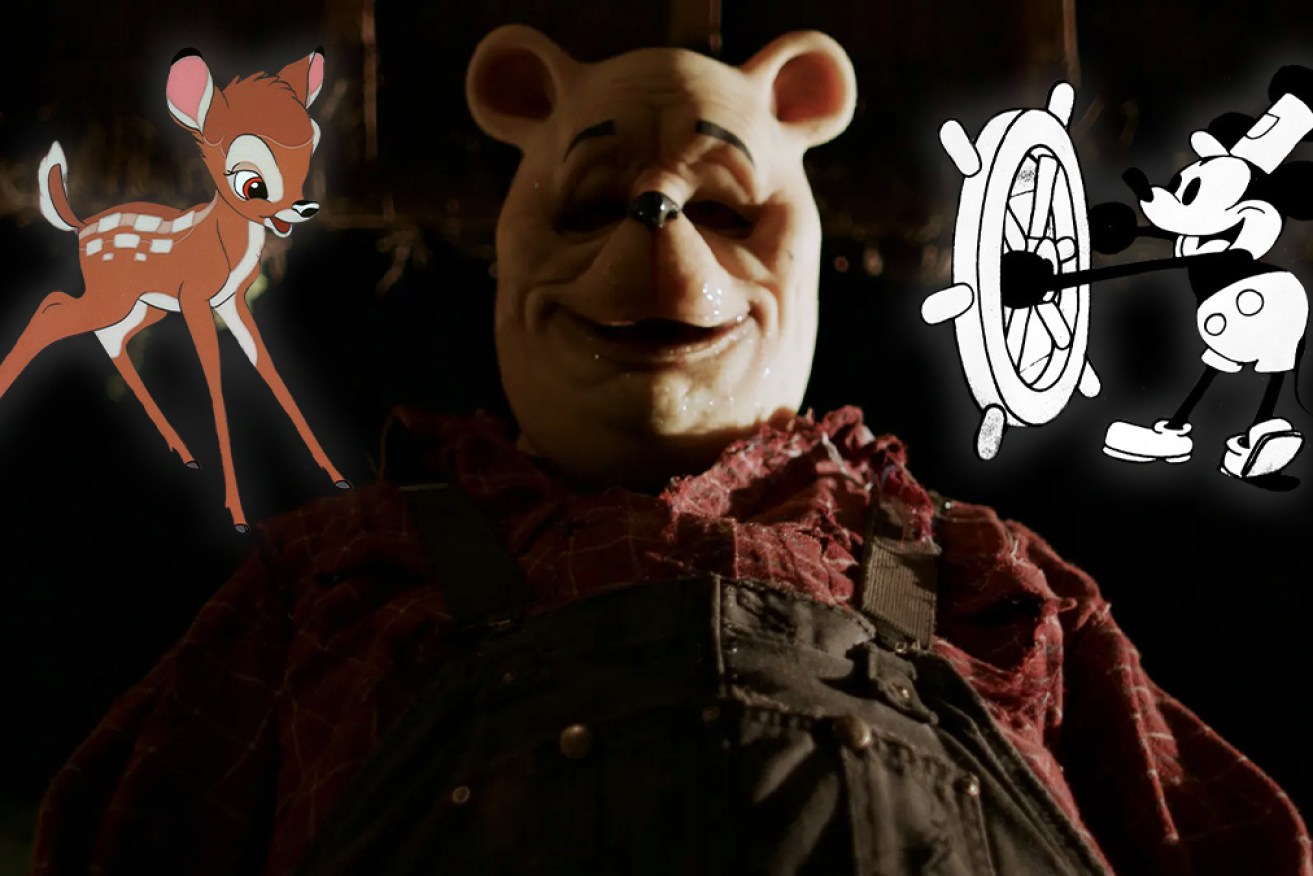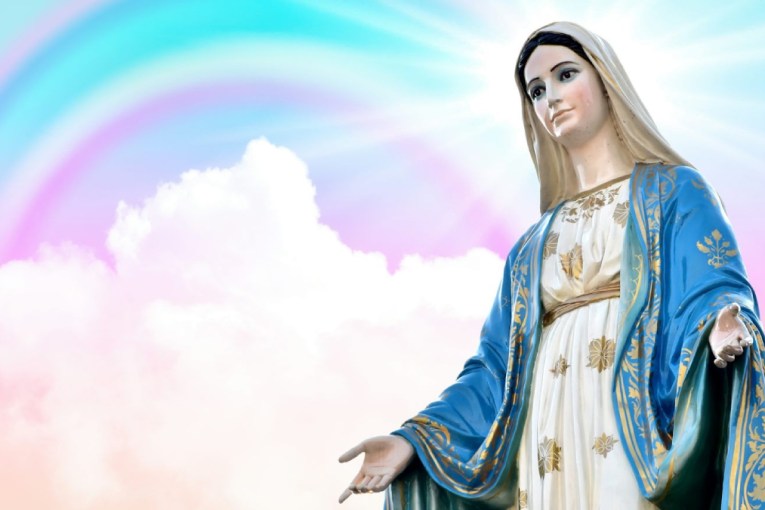Storybook slaughterhouse: Expiring copyright lets Winnie the Pooh star in Blood and Honey


Direction plans to create an entire horror universe of beloved children's characters. Image: Getty, TND
The creator of a Winnie the Pooh-inspired slasher film says he hopes to create a whole universe of twisted childhood-character horror films.
The iconic yellow bear found itself in the headlines last year when it was announced that a horror movie based on A.A. Milne’s classic was coming to cinemas.
Winnie the Pooh: Blood and Honey has been a shock success, already scoring a killer response in Mexico, where it earned $US1 million in a matter of days ahead of its global theatrical release on February 15.
The film, set to arrive in theatres down under on February 16, is poised to terrify Australian audiences.
Now the film’s creator, Rhys Frake-Waterfield, says he wants to make more movies based on beloved childhood stories and create his own twisted horror universe.
In the public domain
In case you’re wondering how this all came about, no, Disney hasn’t lost its marbles.
In fact, this was all because Winnie the Pooh’s original source material entered the public domain.
According to US copyright law, works enter the public domain 95 years after they are published, meaning they are no longer covered by intellectual property rights.
From January 1 after the conclusion of their 95th year they can serve as the foundation for new creative works, including movies and TV shows.
Frake-Waterfield, who wrote and directed Blood and Honey, says he plans to base more horror projects on children’s classics.
Last year, he told The Hollywood Reporter that a film was in the works based on J.M. Barries’ novel Peter and Wendy, published in 1911. The film, which has the working project Peter Pan’s Neverland Nightmare, will apparently feature a “heavily obese” Tinkerbell “recovering from drugs”.
Now, in a new interview, Frake-Waterfield has revealed Bambi will be his next endeavour, thanks to Felix Salten’s 1923 novel Bambi, a Life in the Woods entering the public domain in 2022. The English translation of the story was published in 1927, explaining the 2022 expiry.
The book was originally published in 1923 in German, meaning the copyright in Austria and the European Union actually expired a few years earlier, in 2016.
Frake-Waterfield says he’s aiming to create an entire horror universe, in which characters from his films will interact with each other.
“The idea is that we’re going to try and imagine they’re all in the same world, so we can have crossovers,” he said.
“People have been messaging saying they really want to see Bambi versus Pooh.”
Disney’s greatest fear
All the aforementioned works would have become public domain in the US much earlier if Disney hadn’t lobbied Congress and pursued legal action to protect its most iconic character.
Of course, we’re referring to the face of the House of Mouse, Mickey Mouse himself. The iconic character first appeared in Steamboat Willie back in 1928, meaning his time is up on January 1, 2024.
The world’s favourite rodent was originally meant to become public domain back in 1984, when US copyright law stated that copyright expired after 56 years.
After much lobbying and in order to protect Disney’s animations, Congress passed a new act that would protect works for 50 years after the death of the work’s author.
This was extended again due to new legislation in 1997, meaning Mickey would be locked up until 2024.
Who knows – Disney could very well make another appeal to Congress to extend Mickey’s copyright again – though it is running out of time.
And, if we’re being honest, Disney would only be delaying the inevitable. Year by year, Disney will also lose the copyright to its other iconic characters.
Members of the Magic Kingdom gang, including Pluto and Donald Duck, will become public domain by 2030 if US copyright law stays as it is.
And Disney’s first feature film, Snow White and the Seven Dwarfs, will have its copyright expire on January 1, 2033, since it came out in 1937.
But there is a silver lining for Disney. Only the original version of Mickey Mouse, as he appears in Steamboat Willie, will be up for grabs. That means any of the character’s distinguishing features added after 1928 will guarantee ongoing protected.
In the 1928 iteration, Mickey had much smaller feet – his big yellow boots not yet part of the character – and he was in black and white, so not yet wearing his red overalls.
The ever-changing Mickey
He also wasn’t wearing his white gloves, nor does he say a word throughout the entire short, meaning his shrill, high-pitched voice could also remain out of reach.
Plus, Disney also holds trademarks on its characters. Unlike copyright, trademarks do not have an expiry date.
This means that filmmakers hoping to use Mickey in any future projects will have to be extremely cautious.
Anyone who decides to use the 1928 Steamboat Willie Mickey will need to ensure that it does not imply in any way that their project is associated with Disney.
If they use Mickey in a way that makes people think of Disney, the House of Mouse could argue its trademark has been violated.
The game’s afoot for Sherlock Holmes
It’s not only Disney that faces losing the copyright to its most iconic characters.
DC Comics, the main rival to Disney’s Marvel Entertainment, will lose the copyright for three of their most popular comic book characters, Superman, Batman and Wonder Woman. They made their first appearances in 1938, 1939 and 1941 respectively, with Superman the first of the trio to enter public domain on January 1, 2034.
Arthur Conan Doyle’s The Case-Book of Sherlock Holmes also had had its copyright expire in January, despite a long-running copyright dispute.
And in 2025, spinach-chomping sailor Popeye will also enter the public domain in the US.
Other notable expirations coming up are the 1931 film Frankenstein (2026) and 1933’s King Kong (2028), along with Flash Gordon and Donald Duck, who debuted in The Wise Little Hen (both published in 1934 and due to expire in 2029).
But that’s not to say there aren’t already a plethora of public domain characters up for reinterpretation.
Creatives already have access to the original book versions of Tarzan, Ebenezer Scrooge, Robin Hood and Dracula, just to name a few.
And since Greek mythology and literature has been around for thousands of years, characters like Heracles (renamed Hercules by the Romans), Achilles, Zeus and Hades are already free for the taking.








